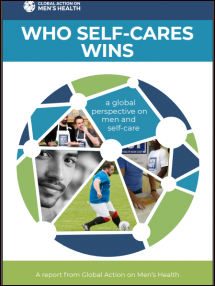Who Self-Cares Wins
Global male life expectancy is four years lower than female and the ‘sex gap’ is widening. There are also significant variations in men’s health outcomes between and within countries. Improved men’s self-care practices would result in better health for men as well as for women and children. They would also help achieve UN’s SDGs and reduce costs for health systems.
This is the first report to look at men and self-care systematically at the international level. In large part, the status of men’s health care is the result of men’s health practices, such as smoking, risky levels of alcohol consumption, an inadequate diet and not using health services effectively. These practices are primarily the result of male gender norms and a lack of engagement with men’s health by health policymakers and practitioners at all levels from the local to the global.
But the SDGs and other developments, including the adoption of a men’s health strategy by WHO Europe and emerging evidence about how to work with men effectively, have created a new opportunity for men’s health advocates to make the case for a fresh approach. Measures to improve men’s knowledge and health literacy and their access to primary care as part of an overarching strategic framework would help to improve men’s self-care and their health outcomes significantly.
Last modified: September 9, 2020
Language: English

